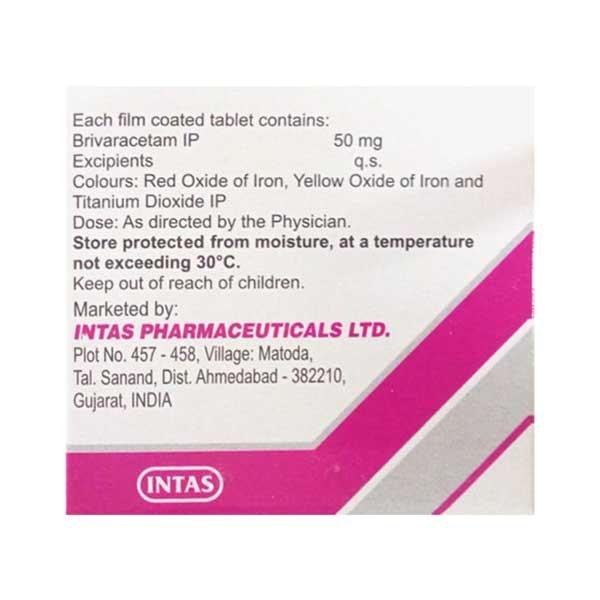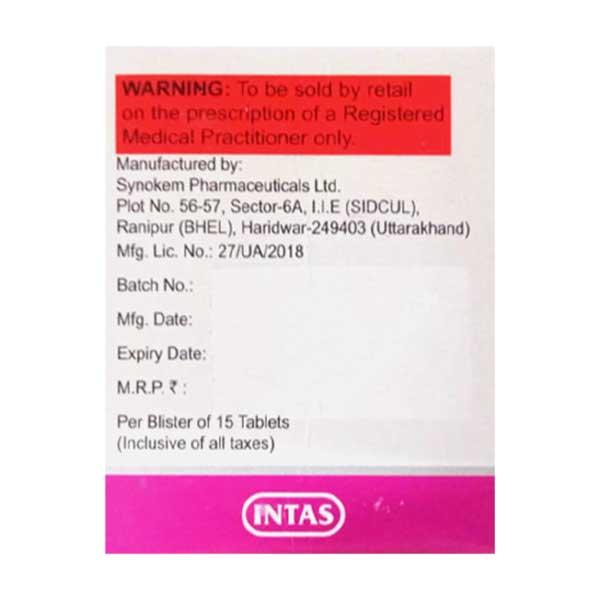

Netmeds First Membership
Quick Links
Introduction About BRIVAZEN 50 TABLET
BRIVAZEN 50 TABLET is used to manage epilepsy. It contains Brivaracetam which belongs to the group of medicines called Anti-epileptics. It works by attaching itself to specific sites (SV2A) on the surfaces of nerve cells which suppresses the abnormal activity of the nerve cells in the brain and manages the spread of electrical signals that cause seizures.
Before taking BRIVAZEN 50 TABLET inform your doctor if you have depression, self-harming thoughts, or any unusual changes in mood and behaviour. It is not recommended to use in patients with severe liver problems. It is not recommended for use in pregnancy and breastfeeding. BRIVAZEN 50 TABLET is not recommended for use in children under 4 years of age.
The most common side effects of taking BRIVAZEN 50 TABLET are feeling sleepy or dizzy, flu, feeling very tired, convulsion (a feeling of spinning), feeling and being sick and constipation, depression, anxiety, not being able to sleep, irritability, infection of nose and throat and decreased appetite. Contact your doctor if any of the symptoms worsen.
Uses Of BRIVAZEN 50 TABLET
- Used to manage epilepsy
How BRIVAZEN 50 TABLET Works
BRIVAZEN 50 TABLET works by attaching itself to specific sites (SV2A) on the surfaces of nerve cells which suppresses the abnormal activity of the nerve cells in the brain and manages the spread of electrical signals that cause seizures.
How to use BRIVAZEN 50 TABLET
- Take BRIVAZEN 50 TABLET as advised by your physician
- Swallow the medicine with a glass of water. Do not crush or chew the medicine
- Your doctor will decide the correct dose and duration for you depending on your age, body weight, and disease condition
Side Effects Of BRIVAZEN 50 TABLET
Common side effects of BRIVAZEN 50 TABLET:
- feeling sleepy or dizzy, convulsion, feeling of spinning (vertigo)
- flu
- feeling very tired (fatigue)
- constipation
- anxiety not being able to sleep (insomnia), irritability
- infection of the nose and throat, cough
- decreased appetite
- restlessness and hyperactivity (psychomotor hyperactivity)
- nervous excitement (agitation)
- self-harming thoughts
- decrease in white blood cells
Warning & Precautions
Pregnancy
Monitoring requiredBRIVAZEN 50 TABLET is not recommended for use in pregnant women unless considered necessary.
Breastfeeding
ContraindicatedBRIVAZEN 50 TABLET is not recommended for use in breastfeeding women as it may pass through breast milk.
Driving and Using Machines
Use with CautionDo not drive or operate any machines if you feel sleepy, dizzy or tired while taking medicine.
Alcohol
Consult your doctorAvoid consumption of alcohol while taking the medicine.
Kidney
ContraindicatedBRIVAZEN 50 TABLET is not recommended for use in patients with impaired renal function.
Liver
Use with CautionBRIVAZEN 50 TABLET should be taken with caution in patients with hepatic impairment.
Allergy
ContraindicatedDo not take BRIVAZEN 50 TABLET if you are allergic to Brivaracetam or any other ingredients of this medicine.
Use In Pediatrics
ContraindicatedBRIVAZEN 50 TABLET is not recommended for use in children under 4 years of age.
Use In Geriatrics
Use with CautionBRIVAZEN 50 TABLET should be used with caution in elderly patients (aged 65 years and above).
Others
Before taking medicine, inform your doctor if you have:
- depression, suicidal ideations, or any unusual changes in mood and behaviour
Interactions
A. Drug-Drug interactions:
Before taking the medicine, inform your doctor if you are taking:
- Antibiotics (Ex. rifampicin)
- St John’s wort (Ex. Hypericum perforatum)
- Anticonvulsants (Ex. carbamazepine, phenytoin)
Overdosage:
If you or anyone else accidentally takes too much of BRIVAZEN 50 TABLET, consult your doctor immediately or visit the nearby hospital. Symptoms of overdose include dizziness, sleep, feeling sick, a feeling of spinning, problems keeping your balance, anxiety, feeling very tired, irritability, being aggressive, not being able to sleep or self-harming thoughts.
Synopsis
| Drug | : | Brivaracetam |
| Pharmacological Category | : | Anti-epileptics |
| Therapeutic Indication | : | Epilepsy |
| Dosage Forms | : | Tablet, Injection, Oral solution, syrup |
FAQs About BRIVAZEN 50 TABLET
Q: What is BRIVAZEN 50 TABLET prescribe for?
A: BRIVAZEN 50 TABLET is prescribed to manage epilepsy. Epilepsy is a chronic non-communicable disease of the brain, that affects around 50 million people worldwide. It is characterized by recurrent seizures, which are brief episodes of involuntary movement that may involve a part of the body (partial) or the entire body (generalized) and are sometimes accompanied by loss of consciousness and control of bowel or bladder function.
Q: What are the side effects of BRIVAZEN 50 TABLET?
A: The most common side effects of BRIVAZEN 50 TABLET are feeling sleepy or dizzy, flu, feeling very tired (fatigue), convulsion, a feeling of ‘spinning’ (vertigo), feeling and being sick, constipation, depression, anxiety, not being able to sleep (insomnia), irritability, infections of the nose and throat (such as the ‘common cold’), cough, decreased appetite.
Q: In which condition I should avoid BRIVAZEN 50 TABLET?
A: BRIVAZEN 50 TABLET is not recommended for use, if you have liver disease, alcohol dependence, and self-harming thoughts. Consult your doctor for advice.
Q: Does BRIVAZEN 50 TABLET causes self-harming thoughts?
A: Yes. It may cause self-harming thoughts in some individuals. If you have any of these thoughts at any time, contact your doctor immediately for advice.
Q: Is it safe to take BRIVAZEN 50 TABLET with alcohol?
A: Consumption of alcohol with BRIVAZEN 50 TABLET is not recommended as it can result in dizziness and difficulty in concentration. It is advised that you do not perform any activities such as driving a vehicle or operating machinery if you experience any of these symptoms.
Q: Can I take BRIVAZEN 50 TABLET with or without food?
A: The BRIVAZEN 50 TABLET can be taken with or without food. Swallow the BRIVAZEN 50 TABLET with a glass of water. Consult your doctor for advice.
References
1. Misty D. Smith, Cameron S. Metcalf, and Karen S. Wilcox. Pharmacotherapy of the Epilepsies. Goodman & Gilman’s: The Pharmacological basics of Therapeutics. 13th Edition. New York McGraw Hill Medical 2018. Page – 303-326.
2. Felix Zahnert, Kristina Krause, Ilka Immisch, Lena Habermehl, Iris Gorny, Izabella Chmielewska, Leona Möller, Anna M. Weyand, Peter M. Mross, Jan Wagner, Katja Menzler and Susanne Knake. Brivaracetam in the Treatment of Patients with Epilepsy - First Clinical Experiences. Journal of Frontiers in neurology. February 2018. [Accessed on 2nd May 2022] click here
3. Farbod Khaleghi, and Eric C. Nemec. A Novel Adjunctive Therapy for Partial-Onset Seizures. February 2017. [Accessed on 2nd May 2022] click here
4. UCB Pharma limited. Electronic Medicines Compendium (EMC). [Revised in October 2021] [Accessed 2nd May 2022] click here










